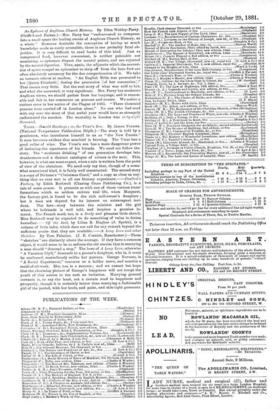TALES.—Harold Hastings ; or, the Vicar's Son. By James Teames.
(National Temperance Publication Depot.)—The story is told by a gentleman, who introduces himself to us as "the New Curate." It soon becomes evident that mischief is brewing. The Vicar has a good cellar of wine. The Vicar's son has a more dangerous power of imitating the signatures of his friends. We need not follow the story. The "moderate drinking" of one generation develops into drunkenness and a distinct catalogue of crimes in the next. This, however, is what one must expect, when a tale is written from the point of view of the abstainer. We need only say that, though of a some- what sensational kind, it is fairly well constructed. The second story is a copy of Dickens's "Christmas Carol," and a copy as close as any- thing that we ever met in all our literary experience.—Coulton' s Factory, by Edith Bothwell (Charing Cross Publishing Co.), is a tale of some power. It presents us with one of those curious trans- formations which so seldom enliven real life, when Margaret, the factory-girl, is found to be the rich mill-owner's daughter ; but it does not depend for its interest on extravagant inci- dent. The love, story between the minister and the girl whom he befriends is well told, and inspires a genuine in- terest. The French maid, too, is a lively and pleasant little sketch. Miss Bothwell may be expected to do something of value in fiction hereafter. —Off the Reel, by Lilian B. Hughes (J. Speirs), is a volume of little tales, which does not call for any remark beyond the sufficient praise that they are readable.—A Long Love and other Sketches. By Tom Palatine. (J. E. Cornish, Manchester.)—These "sketches " are distinctly above the average. If they have a common object, it would seem to be to enforce the old maxim that in marrying a man should "descend a step." The hero of A Long Love, otherwise "A Vacation Idyll," descends to a grocer's daughter, who is, it must be confessed, marvellously unlike her parents. George Norman, in "A Social Experiment," ventures on a bolder move, and marries a maid-of-all-work. She, too, is a success ; and we cannot but hope that the charming picture of George's happiness will not tempt the youth of this nation to too rash an imitation. Marrying general servants is, to say the least, not a certain road to happiness and prosperity, though it is certainly better than marrying a fashionable girl of the period, with her heels, and paint, and skin-tight garments.


































 Previous page
Previous page